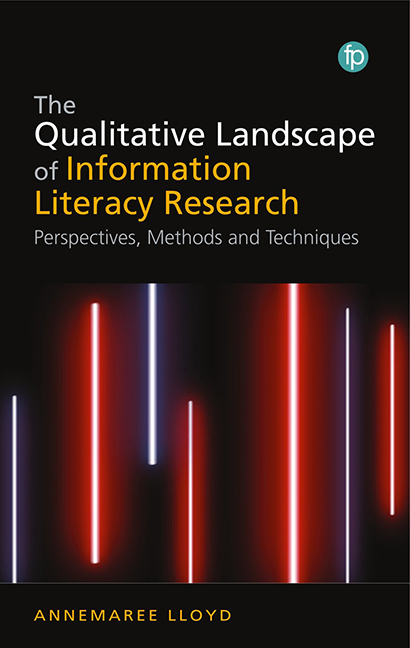Book contents
- Frontmatter
- Contents
- Figures
- Foreword
- Acknowledgements
- Introduction: The Qualitative Landscape of Information Literacy Research
- Chapter 1 Situating Information Literacy Research
- Chapter 2 Informing Information Literacy Research
- Chapter 3 Framing Information Literacy as an Educational Practice for Research. Learning Theories and Models
- Chapter 4 Qualitative Methods in Information Literacy Research
- Chapter 5 Collecting Data About Information Literacy: Data Collection Techniques
- Chapter 6 Planning for Research
- Chapter 7 Qualitatively Speaking and Doing Information Literacy Research
- References
- Index
Introduction: The Qualitative Landscape of Information Literacy Research
Published online by Cambridge University Press: 21 October 2021
- Frontmatter
- Contents
- Figures
- Foreword
- Acknowledgements
- Introduction: The Qualitative Landscape of Information Literacy Research
- Chapter 1 Situating Information Literacy Research
- Chapter 2 Informing Information Literacy Research
- Chapter 3 Framing Information Literacy as an Educational Practice for Research. Learning Theories and Models
- Chapter 4 Qualitative Methods in Information Literacy Research
- Chapter 5 Collecting Data About Information Literacy: Data Collection Techniques
- Chapter 6 Planning for Research
- Chapter 7 Qualitatively Speaking and Doing Information Literacy Research
- References
- Index
Summary
Over the last 47 years, information literacy has become a highly researchable field in education, workplace and everyday settings where it has been investigated and interrogated as a phenomenon, topic, social practice, competence and skill. Bibliometric studies, (Aharony, 2010; Kolle, 2017; Larivière, Sugimoto and Cronin, 2012; Pinto, Cordón and Gómez Díaz, 2010; Pinto, Escalona-Fernández and Pulgarín, 2013) report consistent growth in peer-reviewed published information literacy research and identify broad analytical frameworks, from which the field is explored.
The fundamental importance of information literacy to the contribution of practice and performance has led to its appropriation by other fields, where the core aspects of the practice are reshaped to accommodate contextual differences, leading to growth into areas such as health, finance, media, digital, and algorithmic literacy, to name but a few. Quantitatively, attempts are made in every field and discipline to measure the competency and skills of information use required to designate what it means to be information literate.
Qualitatively, researchers strive to dive deeper in order to understand the inherent dimensions, textures and relations of the practice and its performances, focusing on the contextual aspects, knowledges and social conditions which influence the shape of information literacy, its discourse and operationalisation and the various ways in which it is experienced. Drawing from social theory perspectives and qualitative methods provides information literacy researchers with theoretical, methodological and ethical tools from which to make sense of the information experiences and practices of people in a world which is rapidly changing and through which multiple versions of truth and ways of knowing exist.
Qualitative research perspectives and methodological approaches have the capacity to move information literacy research to a deeper analytical level, opening up new spaces for enquiry. This perspective encourages researchers to move beyond the ever-present objectivist discourses of ‘deficit’ or focus on skills and competencies to consider questions linked to the politics of representation, about how and why these discourses are privileged, to questions which interrogate the role of power in the privileging of certain types or forms of information, or ways of knowing; and to account for the information experiences and practices of ‘other voices’ which have become marginalised, disenfranchised or silenced.
- Type
- Chapter
- Information
- The Qualitative Landscape of Information Literacy ResearchPerspectives, Methods and Techniques, pp. xv - xxiiPublisher: FacetPrint publication year: 2021
- 1
- Cited by



